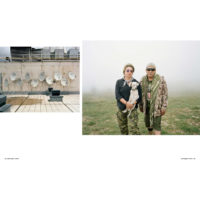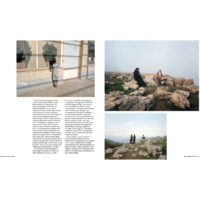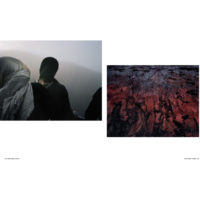-
Hoda Afshar ~ In the exodus, I love you more
Splash & Grab, Issue 4
You must have been there, to the state of hypnagogia, that ephemeral moment between wakefulness and dreaming where time suspends internally? Edgar Allan Poe described it as being, ‘upon the brink of sleep with the consciousness that I am so.’ Experiencing In the exodus, I love you more by Hoda Afshar is akin to being transported to that space. Sometimes the images lull the viewer into dreamlike territory, sometimes they are a jolt into full consciousness, but their focus is always to suggest and examine an expanse in between.
Born in Tehran, Iran, in 1983, Afshar later moved to Australia after completing her degree in Fine Art. She began making In the exodus, I love you more in 2014, searching her complex experience of migration and visually exploring the depths of her altered relationship to home when distance was imposed. This concept of being away is central to the work. Afshar explains that such remoteness ‘increases the nearness of all things to which memory clings, and which renders the familiar…strange, and veiled.’
The title of the work originates from a poem written by Mahmoud Darwish. Interestingly, the American photographer J Carrier also referenced Darwish in his 2012 work Elementary Calculus, another piece centred around awayness. Carrier examined his own experience of what he terms ‘displaced existence’ by photographing migrants in Israel calling home from a public phone box, alongside observations of the surrounding area. In an interview in Hotshoe in 2013, Carrier stated, ‘I knew what it was to be away from home, and away from those you love. I also understood how complicated it can be to return. How our memories and reality can be so different, and how what we hope for can really never be.’ This concept of returning is epitomised in Exodus. The images are extraordinarily intimate purely because Afshar goes back to Iran to face her experience of distance so that she can, as she describes, ‘turn it into a way of seeing.’
This familiarity does not distract from Afshar’s representation of the broad human or social experience of diaspora. Exodus breathes the universal ambiguity associated with migration, asking more questions than it answers. Subjects turn away from our view, veiled, or emerging from the atmosphere of the image. Modern forms of communication mingle with historical landscape. Sometimes the subject matter appears to be astronomical, otherworldly, and out of reach. There is always a surface present to penetrate for more. And amongst all of this we sense a radiation of femininity, of instinct. Where there is longing there is an acceptance of presence and place informed by her own and her country’s contentious history. Western perceptions of Iran are challenged. This is work made in a state of being rather than doing, produced entirely from within.
Most importantly, whilst In the exodus, I love you more is a re-examining of the identity of Afshar’s motherland since losing her physical presence in it, simultaneously it is a re-examining of herself since losing her father, who died as she started to make this work. She says, ‘When I return to Iran, my father’s not being there is everywhere.’ Both her father and her homeland have become just out of reach, perhaps somewhere in that hypnagogic space in between. The work is a broad understanding of diaspora and a more personal study of the loss of her father. It is in the space where these two meet where the photographs are born.
-

-

-

-
